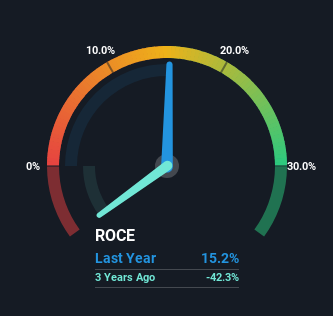
To find a multi-bagger stock, what are the underlying trends we should look for in a business? In a perfect world, we'd like to see a company investing more capital into its business and ideally the returns earned from that capital are also increasing. If you see this, it typically means it's a company with a great business model and plenty of profitable reinvestment opportunities. Speaking of which, we noticed some great changes in Peabody Energy's (NYSE:BTU) returns on capital, so let's have a look.
What Is Return On Capital Employed (ROCE)?
Just to clarify if you're unsure, ROCE is a metric for evaluating how much pre-tax income (in percentage terms) a company earns on the capital invested in its business. Analysts use this formula to calculate it for Peabody Energy:
Return on Capital Employed = Earnings Before Interest and Tax (EBIT) ÷ (Total Assets - Current Liabilities)
0.15 = US$750m ÷ (US$5.7b - US$805m) (Based on the trailing twelve months to March 2024).
So, Peabody Energy has an ROCE of 15%. In absolute terms, that's a satisfactory return, but compared to the Oil and Gas industry average of 13% it's much better.
See our latest analysis for Peabody Energy

In the above chart we have measured Peabody Energy's prior ROCE against its prior performance, but the future is arguably more important. If you'd like, you can check out the forecasts from the analysts covering Peabody Energy for free.
What Does the ROCE Trend For Peabody Energy Tell Us?
You'd find it hard not to be impressed with the ROCE trend at Peabody Energy. The data shows that returns on capital have increased by 92% over the trailing five years. The company is now earning US$0.2 per dollar of capital employed. In regards to capital employed, Peabody Energy appears to been achieving more with less, since the business is using 21% less capital to run its operation. A business that's shrinking its asset base like this isn't usually typical of a soon to be multi-bagger company.
The Bottom Line
In a nutshell, we're pleased to see that Peabody Energy has been able to generate higher returns from less capital. Since the total return from the stock has been almost flat over the last five years, there might be an opportunity here if the valuation looks good. So researching this company further and determining whether or not these trends will continue seems justified.
If you want to know some of the risks facing Peabody Energy we've found 2 warning signs (1 doesn't sit too well with us!) that you should be aware of before investing here.
While Peabody Energy isn't earning the highest return, check out this free list of companies that are earning high returns on equity with solid balance sheets.
New: Manage All Your Stock Portfolios in One Place
We've created the ultimate portfolio companion for stock investors, and it's free.
• Connect an unlimited number of Portfolios and see your total in one currency
• Be alerted to new Warning Signs or Risks via email or mobile
• Track the Fair Value of your stocks
Have feedback on this article? Concerned about the content? Get in touch with us directly. Alternatively, email editorial-team (at) simplywallst.com.
This article by Simply Wall St is general in nature. We provide commentary based on historical data and analyst forecasts only using an unbiased methodology and our articles are not intended to be financial advice. It does not constitute a recommendation to buy or sell any stock, and does not take account of your objectives, or your financial situation. We aim to bring you long-term focused analysis driven by fundamental data. Note that our analysis may not factor in the latest price-sensitive company announcements or qualitative material. Simply Wall St has no position in any stocks mentioned.
Have feedback on this article? Concerned about the content? Get in touch with us directly. Alternatively, email editorial-team@simplywallst.com
About NYSE:BTU
Peabody Energy
Engages in coal mining business in the United States, Japan, Taiwan, Australia, India, Brazil, Belgium, Chile, France, Indonesia, China, Vietnam, South Korea, Germany, and internationally.
Very undervalued with flawless balance sheet.


